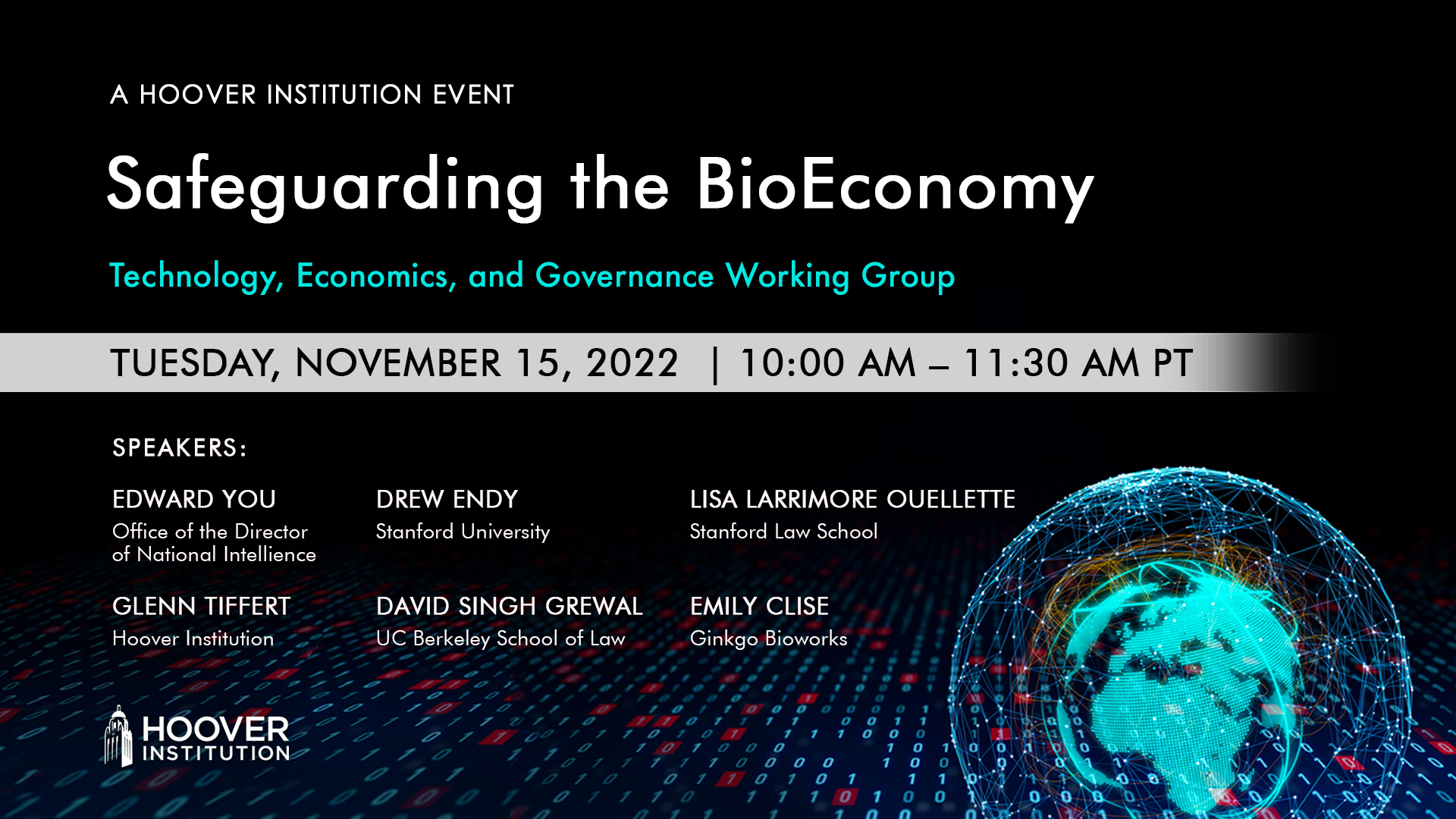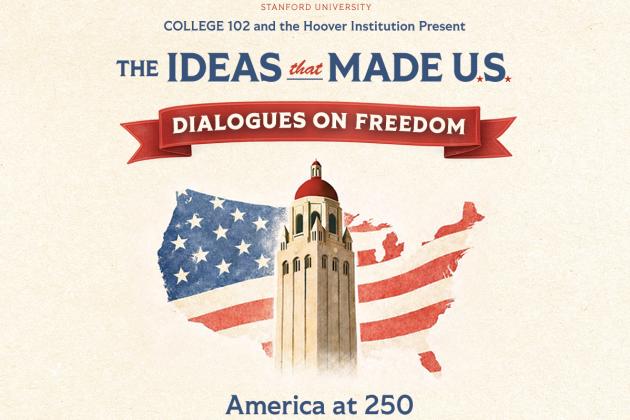The Hoover Institution hosts Safeguarding the BioEconomy on Tuesday, November 15, 2022 from 10:00am - 11:30am PT.
Please join us for a presentation by Supervisory Special Agent Ed You about the development of the bioeconomy, support for biotechnology research, and the opportunities and security challenges facing the United States. In his role as the National Counterintelligence Officer for Advanced and Emerging Disruptive Technologies, Mr. You is focused on tracking fast-moving developments in science to prevent the misuse of biotechnology and bioattacks. Mr. You’s presentation will be followed by a brief panel discussion further exploring perspectives from experts in bioengineering, the history of modern China, and law. The event will conclude with a Q&A with the audience.
US leadership in emerging technology sectors faces growing challenges from strategic competitors who recognize the economic and military benefits of these technologies. Research and innovation in the bioeconomy–including biotechnology, the life sciences, and data sciences–has the potential to unlock significant social and economic benefits across the globe. At the same time, the misuse of this technology by adversaries who do not share liberal democratic values poses a threat to the US and our allies.
We look forward to a robust discussion with Mr. You and our distinguished panelists and hope you will be able to join us in person. All remarks and questions will be under Chatham House Rule.

ABOUT THE SPEAKERS
Edward You is a Supervisory Special Agent in the FBI’s Weapons of Mass Destruction Directorate. Mr. You is responsible for identifying, assessing, and responding to biological threats or incidents. He also supports initiatives to build partnerships across the government and with the life sciences community, domestically and internationally. His overall goal is to safeguard the scientific community, the life science research enterprise, and the U.S. bioeconomy. He is currently on a Joint Duty Assignment at the Office of the Director of National Intelligence (ODNI) serving as the National Counterintelligence Officer for Emerging and Disruptive Technologies. In this capacity, Mr. You serves as the principal adviser to the Director of the National Counterintelligence and Security Center and the relevant National Intelligence Managers on threats to advanced biotechnologies and the bioeconomy.
Mr. You has also been directly involved in policy-making efforts with a focus on biosecurity and protecting biotechnology developments. He served as working group member on the White House National Security Council Countering Biological Threats initiatives and represented the FBI as an Ex Officio member of the National Institutes of Health National Science Advisory Board for Biosecurity. He also served on two National Academies of Sciences, Engineering, and Medicine Committees, the Institute of Medicine’s Forum on Microbial Threats and the Committee on Science, Technology, and Law’s Forum on Synthetic Biology. He is currently a Senior Fellow for the Scowcroft Institute of International Affairs at the Bush School of Government and Public Service at Texas A&M University.
Drew Endy is a bioengineer at Stanford University who studies and teaches synthetic biology. His goals are civilization-scale flourishing and a renewal of liberal democracy. Prof. Endy helped launch new undergraduate majors in bioengineering at both MIT and Stanford and also the iGEM — a global genetic-engineering “Olympics” enabling thousands of students annually. His past students lead companies like Ginkgo Bioworks and Octant. He is married to Christina Smolke CEO of Antheia the essential medicine company. Endy served on the US National Science Advisory Board for Biosecurity (NSABB) the Committee on Science Technology & Law (CSTL) the International Union for the Conservation of Nature’s (IUCN) Synthetic Biology Task Force and, briefly, the Pentagon’s Defense Innovation Board (DIB). He currently serves on the World Health Organization’s (WHO) Advisory Committee on Variola Virus Research. Esquire magazine recognized Drew as one of the 75 most influential people of the 21st century.
Glenn Tiffert is a research fellow at the Hoover Institution and a historian of modern China. He co-chairs the Hoover project on China’s Global Sharp Power and works closely with government and civil society partners to document and build resilience against authoritarian interference with democratic institutions. He also currently serves on the executive committee of the Academic Security and Counter-Exploitation Program, an association of US universities established to help heighten security awareness in academia.
Tiffert is a specialist on the political and legal history of the People’s Republic of China (PRC), and has published scholarship in English and Chinese on the construction of the modern Chinese court system and judiciary, the drafting of the 1954 PRC Constitution, the legacies of Nationalist judicial modernization, and the suppressed genealogy of the rule of law in the PRC. He is also pioneering the integration of computational methods drawn from data science into the study of Chinese history. His current book project presents the first archival study in any language of the takeover and reconstitution of an organ of the Chinese state (the courts) by the Chinese Communist Party. He earned his PhD from the University of California-Berkeley.
David Singh Grewal is a Professor of Law at UC Berkeley School of Law, and a member of the Board of Directors of the BioBricks Foundation. His teaching and research interests include intellectual property law and biotechnology; global economic governance and international trade law; legal and political theory; intellectual history, particularly the history of economic thought; and law and economics. His first book, Network Power: The Social Dynamics of Globalization, was published by Yale University Press in 2008. His second book, The Invention of the Economy, is forthcoming from Harvard University Press. He was a Junior Fellow of the Harvard University Society of Fellows and holds B.A. (Economics) and Ph.D. (Political Science) degrees from Harvard and a J.D. from Yale Law School.
Lisa Larrimore Ouellette is the Deane F. Johnson Professor of Law at Stanford Law School, as well as a Senior Fellow at the Stanford Institute for Economic Policy Research. Her scholarship addresses empirical and theoretical problems in intellectual property and innovation law. She takes advantage of her training in physics to explore policy issues such as how scientists use the technical information in patents, how scientific expertise might improve patent examination, the patenting of publicly funded research under the Bayh–Dole Act, and the integration of IP with other levers of innovation policy. She has applied these ideas to biomedical innovation challenges including the opioid epidemic and the COVID-19 pandemic. She has also written about multiple legal issues in trademark law, about the evidentiary value of online surveys, and about the potential for different standards of review to create what she terms “deference mistakes” in numerous areas of law.
Prior to her appointment at Stanford Law School in 2014, Professor Ouellette was a Postdoctoral Fellow at the Information Society Project at Yale Law School. She also clerked for Judge Timothy B. Dyk of the U.S. Court of Appeals for the Federal Circuit and Judge John M. Walker, Jr. of the U.S. Court of Appeals for the Second Circuit. She holds a J.D. from Yale Law School, where she was an Articles Editor of the Yale Law Journal and a Coker Fellow in Contract Law. She earned a Ph.D. in physics from Cornell University as well as a B.A. in physics from Swarthmore College, and she has conducted scientific research at the Max Planck Institute, CERN, and NIST.
Emily Clise Tully is the senior director of national security at Ginkgo Bioworks, addressing the biosecurity concerns of the international and US national security community. She served on the Senate Intelligence Committee for three and a half years, where she was responsible for the budgets of the Central Intelligence Agency (CIA) and the US Intelligence Community’s Russia mission. As Senator Ben Sasse’s designee, Emily worked to reorient the post-9/11 national security community to America’s emerging strategic conflict with the Chinese Communist Party. Prior to her time in the Senate, Emily spent nearly a decade at CIA, where she led its Public Affairs outreach team, wrote for the president as a political analyst, served a warzone tour, and was a Congressional Fellow. Emily is a graduate of Carnegie Mellon University.
The Technology, Economics, and Governance Working Group, co-chaired byJohn B. Taylor and Amy Zegart, seeks to understand the drivers and dynamics of technological innovation in the 21st century, assess the opportunities and risks that breakthrough technologies are creating, and develop governance approaches that maximize the benefits and mitigate the risks for the nation and the world.


















